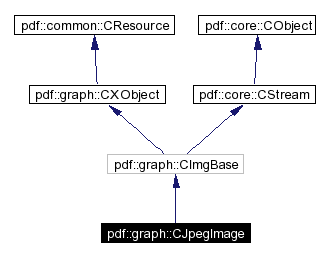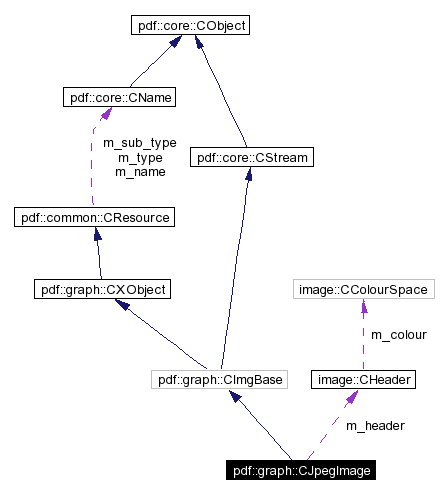
#include <JpegImage.hh>
Inheritance diagram for pdf::graph::CJpegImage:


like the graph::CImage class, this class represent an PDF image xobject. the only difference is that it is for JPEG image files only.
this class exists because of performance. the same job can be done by first reading and decoding the JPEG image file to an image::CImage and create a graph::CImage object, which is also an PDF image xobject. the difference is that this class won't decode the pixel data. it just read the header for information like width, height and colour space etc. it can increase performance by copy the JPEG file directly to the internel buffer, without decoding the image pixels.
|
|
the constructor initialize the object with the JPEG filename.
00052 : m_filename( filename ) 00053 { 00054 ReadHeader( ) ; 00055 } |
|
|
nothing to destroy in destructor. it is a good design.
00060 {
00061 }
|
|
|
virtual copy constructor. Implements pdf::core::CObject.
00066 {
00067 return new CJpegImage( *this ) ;
00068 }
|
|
|
write to PDF file. not used directly by client. Implements pdf::common::CResource.
00080 {
00081 return file.AddObj( new core::CProxyObj( this ) ) ;
00082 }
|
|
|
return the header of the image.
00073 {
00074 return m_header ;
00075 }
|
|
|
getting the image content is easy. just read the file and put the bytes in the output vector. Implements pdf::core::CStream.
00088 {
00089 using namespace std ;
00090 ifstream file( m_filename.c_str( ), ios::in | ios::binary ) ;
00091 output.assign( istreambuf_iterator<char>( file ),
00092 istreambuf_iterator<char>( ) ) ;
00093 return output ;
00094 }
|
|
|
this function will call GetImageInfo() to read image width/height, and then put it in an PDF dictionary.
00100 {
00101 // base class stuff
00102 CImgBase::MakeDictionary( dict ) ;
00103
00104 // JPEG images must use DCT decode filter
00105 dict.AddPair( "Filter", "DCTDecode" ) ;
00106 }
|
|
|
this function will open the image file, and read its header for the image information. the image information will be returned by reference in the parameters.
00113 {
00114 using namespace image ;
00115
00116 struct jpeg_decompress_struct cinfo ;
00117 struct jpeg_error_mgr jerr ;
00118
00119 cinfo.err = jpeg_std_error( &jerr ) ;
00120 jpeg_create_decompress( &cinfo ) ;
00121
00122 // open the file in binary mode
00123 FILE *infile = fopen( m_filename.c_str( ), "rb" ) ;
00124
00125 // throw exception in case of any error
00126 if ( infile == NULL)
00127 throw util::CFileError( errno ) ;
00128
00129 // read JPEG image file header
00130 jpeg_stdio_src( &cinfo, infile ) ;
00131 jpeg_read_header( &cinfo, TRUE ) ;
00132
00133 // support only RGB and grayscale for now
00134 CColourSpace colour_space ;
00135 int channel_per_pixel = 0 ;
00136 switch ( cinfo.out_color_space )
00137 {
00138 case JCS_RGB :
00139 colour_space = image::CColourSpace::RGB( ) ;
00140 channel_per_pixel = 3 ;
00141 break ;
00142
00143 case JCS_GRAYSCALE :
00144 colour_space = image::CColourSpace::Gray( ) ;
00145 channel_per_pixel = 1 ;
00146 break ;
00147
00148 default : break ;
00149 }
00150
00151 // store info in header object.
00152 // hard coded to use 8 bit per channel
00153 m_header.Assign( cinfo.image_width, cinfo.image_height, channel_per_pixel,
00154 8, colour_space, cinfo.X_density, cinfo.Y_density ) ;
00155
00156 // clean up
00157 jpeg_destroy_decompress( &cinfo ) ;
00158 fclose( infile ) ;
00159 }
|
|
|
filename of the JPEG file
|
|
|
image header of the JPEG file
|
 1.2.16
1.2.16